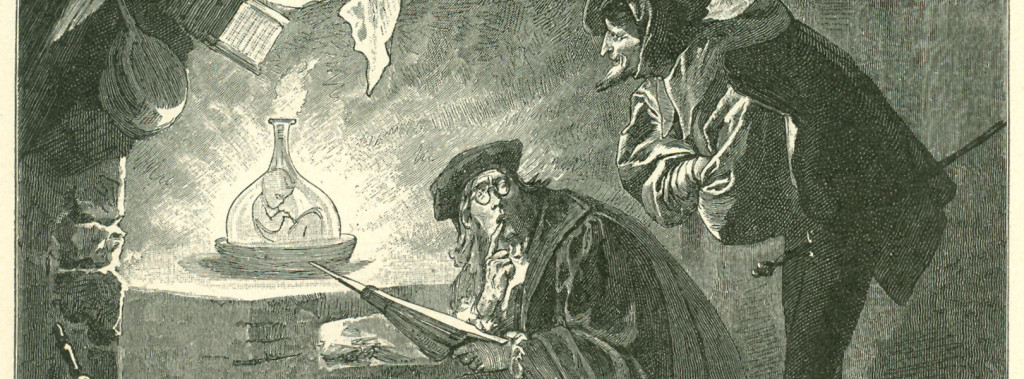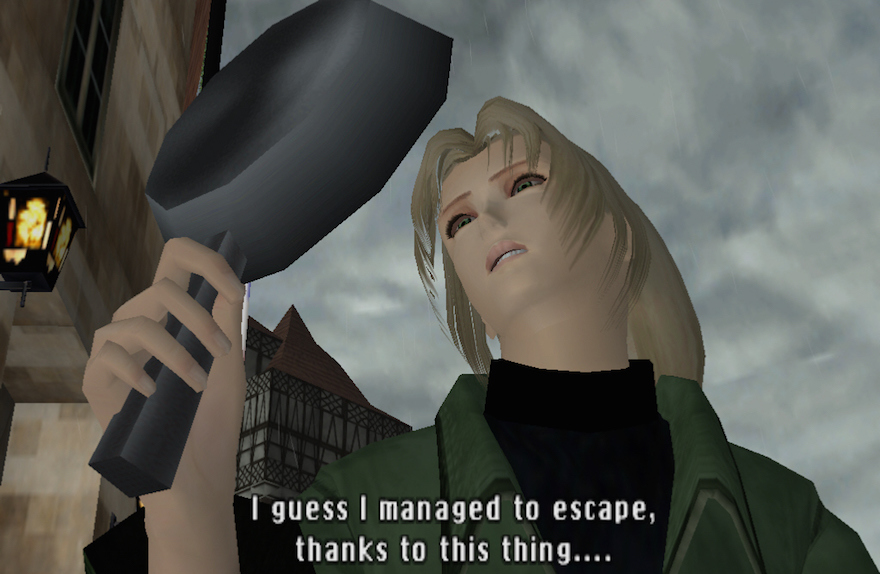This article is part of PS2 Week, a full week celebrating the 2000 PlayStation 2 console. To see other articles, go here.
///
Paracelsus first coined the term “homunculus”—the Latin portmanteau meaning “little man.” The 16th Century occultist used the word to describe a miniature, fully-formed human that he believed could be produced through the “putrefaction” of isolated human sperm within a horse’s womb (yes, you read that correctly). The unconscious desire implicit in this bizarre interspecies experiment—for a man to be able to create life without the aid of a woman—was apparently lost on Paracelsus. He presented the idea as a literal and serious possibility of alchemical science, a practice interested in all manners of manipulation beyond known natural laws, including the search for the fabled “Philosopher’s Stone,” which could purportedly turn lead into gold and grant eternal life.
Hundreds of years later, the homunculus was resurrected in modern parlance through the 19th century epic Faust (1808) by German playwright Johann Wolfgang von Goethe. In Part Two of the play, Faust and the devil Mephistopheles encounter an artificial human created by Faust’s former assistant Wagner. In direct contrast to Paracelsus, Goethe employs alchemy as a metaphor, in part to represent the dangers of post-Enlightenment science which he saw as fundamentally amoral. Goethe’s homunculus is a soul unshackled by the material plane, and is depicted as being on a journey that mirrors Faust’s: while the latter is a mortal soul trying to shed his body, the homunculus is a kind of pure spirit working to become human. In an eerie foreshadowing of contemporary concerns over the singularity, Mephistopheles suggests that a creature born of human science, being unbound from nature, may ultimately come to dominate us: “Upon the creatures we have made,/ We are, ourselves, at last dependent.”
In the 20th Century, the homunculus was adopted as a largely derisive term levied at Cartesian dualism, the notion of a separation between the material and immaterial, body and soul—the very distinction Goethe used the homunculus to illustrate. The absurdity of a “little man inside your head” became a central argument for mid-century cognitivists to dismiss the study of metaphysics en masse: if there is a homunculus within you, processing stimuli and guiding your actions, then who processes its stimuli and guides its actions? Another homunculus, and so on through infinity? The impossibility of this model was used to advocate a separation between the studies of philosophy and brain science, an ironic new dualism that persists today.
The next important appearance of the homunculus in popular culture, at least in my view, arrived in the PS2 cult classic Shadow of Destiny (2001). It is the name given to the churlish overseer who helps guide you through the game world’s complex web of time and space. Developer Konami uses the term with full awareness of its long and varied history, and taken as a whole the game stands as a multi-tiered experience that touches upon all three of the major manifestations of the homunculus outlined above: the literal, the metaphorical, and the critical. The game is an astonishing work that, despite its substantial camp and silliness, manages all at once to be a compelling yarn about time travel and alchemy, an informed take on Western metaphysics, and a presage of the postmodern turn in videogames.

///
Shadow of Destiny begins with your murder. You are stabbed in the back on an empty street in a quaint European hamlet.
You wake up in purgatory, depicted as a room filled with oversized fallen statues, bookcases, and other historical detritus, all of it surrounded by an endless void. A strange voice waxes vaguely on the challenges of averting fate, suggesting that it can help you reclaim your life. The voice belongs to a creature you will later learn is named Homunculus, who in appearance looks like an androgynous young person with red eyes and all-black clothing. Initially, you reject the offer: “I get it,” you call out. “You’re the big S, the devil. ‘In exchange for your immortal soul’ and all that, am I right?” The voice replies with a casual impatience: “Your soul? Oh, please… in this day and age?” From this very first exchange the game encourages a comparison with Goethe’s Faust—the most famous deal-with-the-devil story in Western civilization—while simultaneously suggesting that the times have changed, and that metaphysical morality isn’t what it used to be.
Eventually you accept Homunculus’ help, and it provides you with a “Digipad,” which looks like a late-1990s electronic organizer but in fact is a magical device that allows you to travel through time. Since you were murdered on an empty street in the middle of the day, your first task after returning to the land of the living is to travel to 30 minutes before “the fated hour” to convince a crowd to gather in the town square, thus shielding yourself from a lonely death.
This, however, is only the beginning. You will be murdered many more times before the day is through, from smoke inhalation to having a vase dropped on your head to several more backstabs. Each instantiation drives you further into the town’s past and puts you in deeper contact with the generations of individuals who inhabit it. There’s the medieval squire whose wealthy descendants own the modern-day classical art museum. The populist local filmmaker whose ancestor was the acclaimed local painter. And then there’s the contemporary fortune-teller who lives in a building labeled on your map as the “Former Alchemist’s House.”
Alchemy is central to the plotline of Shadow of Destiny, from Homunculus to the quest for the Philosopher’s Stone. The earliest timeline you visit is, not coincidentally, the 16th Century, where you meet an alchemist, not coincidentally, named Wagner. As the literal elements of alchemical lore drive the story, the symbolic meaning behind unnatural manipulations of nature becomes an increasingly prevalent theme. Because, of course, you are not simply a time-traveling tourist, taking in some firsthand history before heading home; you are changing things to save your own skin. Much of the time what that amounts to is changing people: confusing them, misdirecting them, convincing them to do things that they weren’t intending to do before you magically appeared with a pointed suggestion.

This is a game of mad logic. A game that asks you to resolve the matter of your killer hiding behind a tree by going back to the 1500s and convincing the townsfolk to plant flowers instead of a mighty oak. A game in which you remedy food poisoning by travelling to the 1900s in order to convince a guy to build a library instead of an art museum, so that in the present day you can find a book about how to make an antidote, which in turn can only be procured in the 16th Century. The recklessness with which you regard the sanctity of the past and the wills of those who live there is unprecedented for the time travel genre, which typically obsesses over the importance of making as small an impact as possible. You often have the option to alter things for your own amusement, as well: arbitrarily suggesting subject matter to the 16th Century painter Franssen, for instance, only to zap back to the present day and see your ideas framed and fawned over at the local museum.
The first few times you play through Shadow of Destiny (at least six iterations are required to truly complete the game), the metaphysical commentary comes across as rather cynical. In order to justify your careless manipulation of the world, there is an uncomfortable presumption that your life must be so much more important than anyone else’s. Even more disturbing is how susceptible all the people around you are to manipulation. No one seems to have a solid sense of self, a drive to be someone or do something that can’t be knocked off course after a brief conversation with a guy in strange clothes holding an electronic organizer in his hand. If there is a soul, something immutable within us that exists independent of our decaying bodies, no one appears aware of it besides you. They’re all puppets on your string.
Then, on your fourth playthrough, something interesting starts to happen. You start to question the internal logic of this town and wonder if, in fact, you’re not the one being fucked with. The first three endings the game presents are either disappointing or gruesome, with many plot threads left dangling. If you’re truly the puppetmaster, why are so many questions still unanswered, and why do you feel like you’re following the same well-worn path on every outing? This is when you start to realize that you have been tricked by an entity born not of nature but of science. Homunculus is a liar, but even more, Shadow of Destiny is: you’ve been outsmarted by a videogame.
Homunculus essentially stands as a proxy for the game designer, feeding you convenient hints for how to approach the improbable solutions to each of your deaths. “Why not try the library?” it suggests. “Oops! I guess it’s the art museum now…” Until now, you have been assuming that these hints are the only way to approach the problem, and that once addressed there is nothing else for you to see or do. In effect, you have given up your personal agency in the service of this digital creation. “Upon the creatures we have made,/ We are, ourselves, at last dependent.”
So you start to mess around a bit more. Even though the Digipad starts glowing—instructing you to return to your original time—you stay where you are and explore other parts of the town, talk to new people, or travel to an age that isn’t directly relevant to the task at hand. You soon discover that Homunculus is lurking in times and places that it doesn’t want you to know about. By defying the dictates of your guide and charting your own course, you begin to expose Homunculus’ deception. New sequences open up, obscurities are revealed, and more satisfying endings become available.

This is what makes Shadow of Destiny something truly special, a kind of proto-postmodern videogame anticipating titles like Portal (2007) or The Stanley Parable (2013) that challenge players to disobey in-game instructions. These more recent games speak to a turn in design philosophy that reflect global cultural shifts regarding distrust of authority and the status quo. But over a decade before anyone knows the name Edward Snowden, Shadow of Destiny equates blindly following the will of a game to the act of forfeiting your immortal soul. “Oh, please… in this day and age?” Homunculus chides you not because the soul is an irrelevant construct, but because it knows that you have already forsaken it, given over to false dualities of mind and brain, science and philosophy. That you erroneously trust the digital world to be simpler and easier to master than the corporeal one.
Seeing Shadow of Destiny through to its very end is like spiritual electroshock; a reminder that the self can no easier be grown in a horse’s womb or an alchemist’s lab than it can be found in adhering to the path of human-made fictions. In the guise of a campy time-travel mystery, Shadow of Destiny anticipates a desire for games to explore the philosophical implications of playing games; we are only recently seeing other developers beginning to catch up. It invites you to peel back the veil of digital manipulation and recall what it means to be human in the first place.
